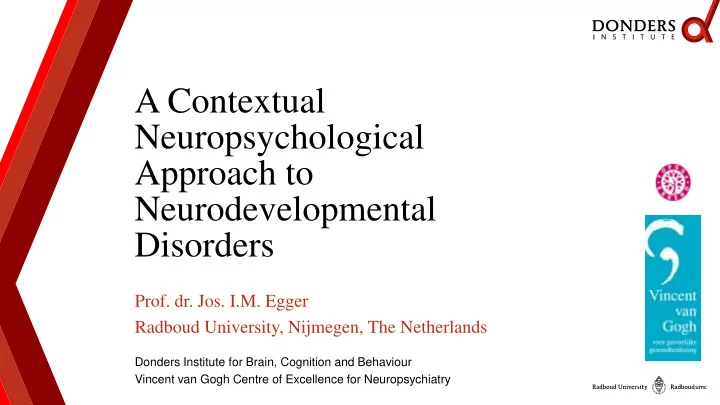

A Contextual Neuropsychological Approach to Neurodevelopmental Disorders Prof. dr. Jos. I.M. Egger Radboud University, Nijmegen, The Netherlands Donders Institute for Brain, Cognition and Behaviour Vincent van Gogh Centre of Excellence for Neuropsychiatry
Radboud University Nijmegen, The Netherlands Psychiatry and the Venray community: Interconnected for more than a century Vincent van Gogh Institute Venray, The Netherlands
We see: prevalent syndromes, e.g., Noonan/Rasopathies, 22q11.2DS, PWS, Klinefelter; And often: rare syndromes, such as Kleefstra, 16p11.2, KBG, KoolenDeVries, Kabuki, SATB2 Associated Syndrome (SAS). www.cvneuropsychiatrie.nl www.vvgi.nl
Our clinical (research) strategy for a specific syndrome: • For individual purposes: Detailed assessment of cognition • Establishing individual profile of cognitive ‘action in context’ • Matching or developing training/treatment and guidance strategies AND WHEN SEEING MANY MORE PATIENTS: • Cumulative (group) data possible establishment of cognitive phenotype
Outline of the talk • Contextual neuropsychology: A clinical strategy accompanied by research • Neuropsychological framework: Key concepts relevant for description and understanding of (problems in) daily functioning • Social information processing/social cognition: Description and example of a genetic disorders in which fruitful discovery of a syndrome-specific profile and training was made • The case of PMS: Regression, cognition and behaviour. Adaptation and further development of assessment and training methods
Same gene – different appearances: Why? What now? Clinical classification problem
Neuropsychological framework Neuropsychology - clinical research discipline that combines neurosciences with social sciences - relations between brain and human cognitive, emotional, and behavioural functions - cognitive phenotyping Mental processes involved = Cognitive functions in thinking and experiencing
Neuropsychological framework - intelligence - language - perceptual and motor functions - attention and speed of information processing - executive functions - learning and memory - affective information processing, social cognition
You CAN perform neuropsychological tests in children with moderate to severe ID, even when nonverbal. Vermeulen, K., Staal, W., Janzing, J., Van de Ven, F., Oomens, W.,Van Dongen, L., Van Bokhoven, H., Kleefstra, T., Egger, J. Computerized Neurocognitive Assessment in Rare Genetic Disorders with Moderate to Profound Intellectual Disabilities: A proof of principle study. Clinical Neuropsychiatry, 2018. • Tasks from the (adapted) Cambridge Automated Neuropsychological Battery (CANTAB) can be used from a developmental age of 2,5 years • Can also be used transspecies
Neuropsychology in PMS - moderate to severe intellectual disability with profound - communication deficits, characterized by dysfunctions in - speech/language and - executive attention, as well as - cognitive alexithymia and - emotional instability
Treating impairments in social cognition - Behavioural training and management - Psycho-educational interventions - Cognitive Behavioural Therapy (CBT) - Coaching, psychosocial support - Targeted to multimodal therapies such as SENS (Roelofs et al. 2018)
What to do? Some recommendations from a neuropsychological viewpoint Integrating neuropsychological diagnosis and treatment into the care for individuals with PMS by annual neurocognitive and behavioural screenings until adulthood and beyond Conducting neuropsychological assessments at key transitional stages (e.g., 3y; 10-12y; 16-18y) Adapt evidence based interventions for cognitive, behavioural or psychosocial problems from other populations to meet the needs of individuals with PMS (e.g., DBT) Further development of reliable and valid proxy based assessment instruments for neurocognitive functioning Exploring the utility of automated (augmentative) communication devices to enhance communication and training and guidance possibilities (Possibly) Exploring the utility of Transcranial Magnetic Stimulation based on studies about cerebellar basic symmetrization / regulation of motor function, cognition and behaviour
GRACIAS! Thanks for your (sustained) attention! A Contextual Neuropsychological Approach to Neurodevelopmental Disorders Prof. dr. Jos Egger E-mail: j.egger@donders.ru.nl
Recommend
More recommend